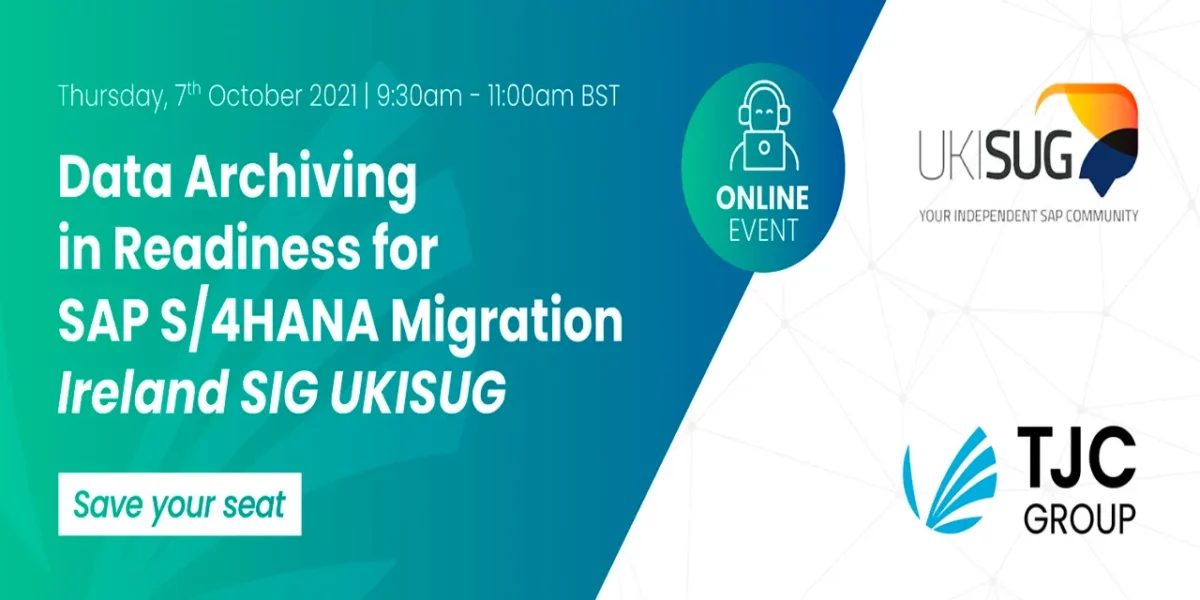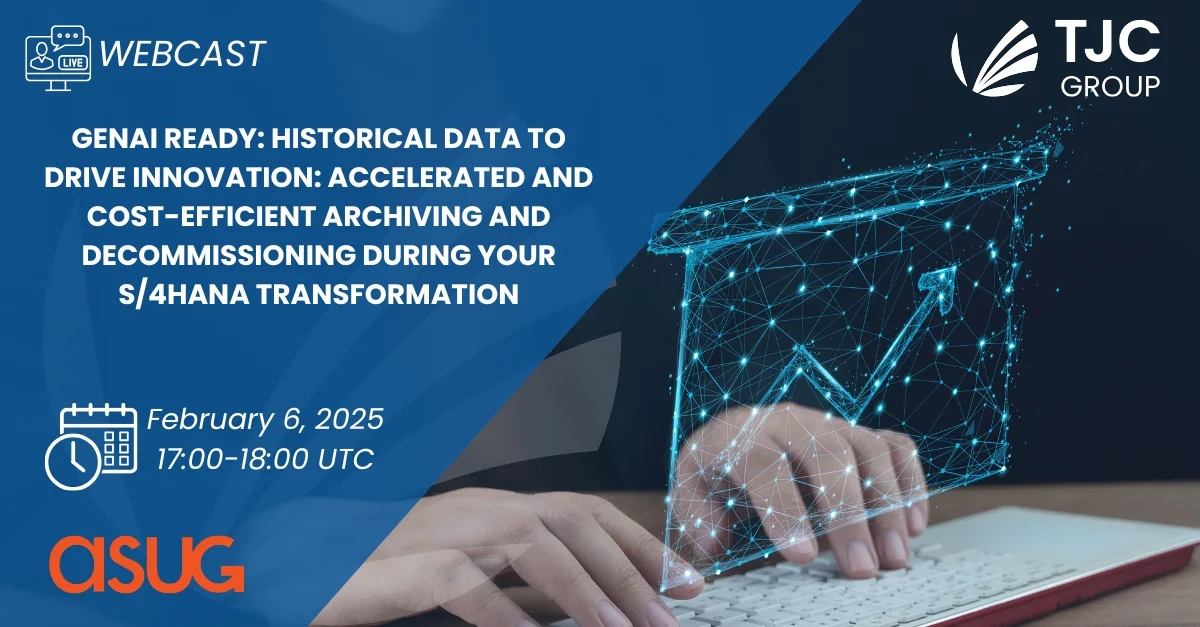Data Archiving, Decommissioning, S/4HANA, SAP ILM

1 JANUARY, 1970
00:00
Virtual
About this event:
The Ireland SIG provides a forum for SAP customers to learn, network, collaborate and influence SAP by creating a platform to discuss common challenges relating to all aspects of SAP, through formal presentations and informal networking. The SIG receives regular updates from SAP and partners on future products, services and solution roadmaps.
TJC Group session
Session title: Data Archiving in Readiness for SAP S/4HANA Migration
Who should attend this event?
SAP Managers, CFO, IT Manager, IT Director, Director of Global IT Finance Projects, S/4HANA Project Manager, ERP Manager, Data Governance Team, Data Steward, Application Data Architect, Data Quality Analyst, Chief Data Officer.
Global corporations that operate in high transaction volume industries generate huge amounts of data; that impacts their ERP systems performance, increasing the Total Cost of Ownership (TCO). Additionally, IT teams are under pressure to support corporate functions with minimal resources.
Why should you archive data before migrating to S/4HANA? What are the tangible benefits of an ILM strategy for your business?
The SAP landscape is changing. S/4HANA and HANA memory will bring unrivalled business benefits for companies, yet it is important to start planning the migration at an early stage to keep data compliant while reducing the TCO of your SAP HANA landscape.
By archiving old data that is no longer in daily use, and by introducing ILM as part of your archiving strategy, you can significantly reduce your data volume prior to the move to SAP S/4HANA
What will you learn in this highly informative,“how-to” session?
Ensure your new S/4HANA system performs at its best and reduces your memory costs, helping you to deliver business benefits from day one. Learn how British Telecom have managed a move to the HANA Enterprise Cloud (HEC) in readiness for migration to S/4HANA
Key takeaways
Find out why leading corporations have implemented Data Archiving to maintain SAP system performance as their business data increases over time while lowering the TCO of their SAP system.
If you cannot attend the session, please contact us and we will send you the recording and slides of the presentation.

Join the largest global community of SAP professionals, gain deeper insights into upcoming trends, and more at SAPinsider Las Vegas…

Are you looking for a smoother, streamlined, and successful SAP S/4HANA migration? Our webcast is just the right place to…

Want to stay informed with our latest/ upcoming events?
The wait is over, subscribe to our events in one click.
Your data will be processed by TJC Group and will not be communicated to third parties. You can unsubscribe from our communications or withdraw your consent at any time. For more information about unsubscribing and processing your personal data, please see our Privacy Policy.
Business 2 Government, S/4HANA, Tax and audit readiness

1 JANUARY, 1970
00:00
Virtual
About this event
Organised by the UK & Ireland SAP user group (UKISUG), the Financial Excellence SIG aims to provide an opportunity for SAP Financial and IT users who use and support Finance and BPC modules. This is an opportunity to get connected and share our experiences, best practices and
knowledge gained.
TJC Group session
Business 2 Government: How to Manage SAP Tax Compliance Efficiently?
As your organisation grows and expands into new markets, tax compliance becomes more complex. The digital landscape for tax compliance is fast-evolving and keeping up with both region-wide and country-specific legislation is an ever-increasing challenge for businesses worldwide.
To be tax compliant, companies must submit the right information at the right time and in the correct format, facing sometimes extremely tight deadlines. But finding the right information in your SAP systems isn’t always easy. It requires the cooperation of several players from the SAP and IT teams that need to communicate and understand each other. Find out how to design and configure your SAP systems to respond to the tax digitalisation imperative
What will you learn in this session?
From a Tax perspective
From an SAP perspective:
SAP session

SAP S/4HANA Cloud for advanced financial closing
James Willis from SAP will present SAP S/4HANA Cloud for advanced financial closing
The month-end close is stressful for any company. Your finance management team needs the visibility to ensure everyone is on track to produce complete, accurate, and timely financials. SAP S/4HANA® Cloud for advanced financial closing centralizes standard operating procedures across systems (Cloud and On premise), of a full end to end period end process.
It orchestrates automated routines, and accelerates manual processes. Management teams gain insight into the progress of each close.
Sam Karbani from SAP will deliver an update on the changes to the VAT report and the introduction of Postponed Accounting following the UKs departure from the EU.
If you cannot attend the session, please contact us and we will send you the recording and slides of the presentation.

Steve Pierce ,Head of Sales UK & Ireland
TJC Group

Join the largest global community of SAP professionals, gain deeper insights into upcoming trends, and more at SAPinsider Las Vegas…

Are you looking for a smoother, streamlined, and successful SAP S/4HANA migration? Our webcast is just the right place to…

Want to stay informed with our latest/ upcoming events?
The wait is over, subscribe to our events in one click.
Your data will be processed by TJC Group and will not be communicated to third parties. You can unsubscribe from our communications or withdraw your consent at any time. For more information about unsubscribing and processing your personal data, please see our Privacy Policy.